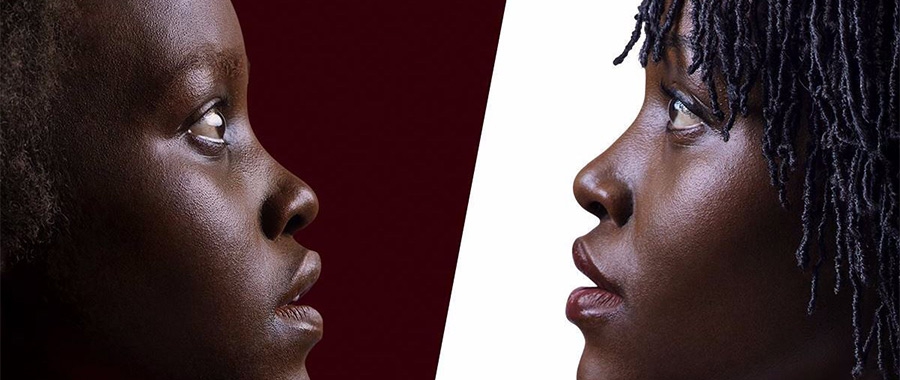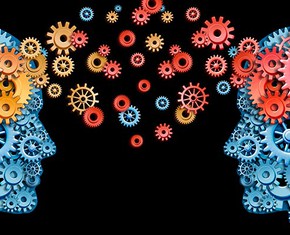The views expressed in our content reflect individual perspectives and do not represent the authoritative views of the Baha'i Faith.
Last night I saw Us, Jordan Peele’s movie that’s making waves in the world of film as we speak.
(Spoilers ahead—so be warned if you have yet to watch it.)
Like so many pieces of provocative art, there are many multi-layered, intricately related, and thought-provoking themes woven into the details of the film. Without a doubt, this is one of those movies where you can walk away from the theater with a vastly different take away from the person sitting right beside you. There’s just so much to examine. Just in one viewing, I picked up on themes around mass incarceration, the school-to-prison pipeline, maternal instinct, American historical fraudulence, American denial, and capitalism.
One theme stuck out to me as especially powerful, because it carried a message that not only got people thinking, but maybe even have a spiritual ripple effect on the audience: whether we are aware of it or not, we humans are deeply interconnected. Though we’ve successfully created barriers that have us believing that we are fundamentally different from one another—that some of us are good to the core and others rotten—this is not true. The suffering of some inevitably leads to the suffering of all.
After we watched over an hour of Lupita Nyongo’s first character, Adelaide, trying to protect herself and her family from their tethered counterparts, we find out that Adelaide was actually from the world of the tethered people the whole time. When she was just a young girl, the two switched places, and the “normal” person we’d been rooting for the entire time was not even from this realm. She was originally born into the world of the shadow people who lived deep underground, forced to just mimic the motions of a life that they were deprived of fully living.
When I found out that “Adelaide” was largely the product of the resources she had access to, that she had suppressed her more animalistic responses to trauma, and chose to leave behind the suffering and oppression of her childhood, I got chills. Besides the shock of discovering something that you’d totally missed as an audience member, this plot twist carried so much meaning.
Let’s state the obvious: most people claim that we should have unity on earth, and that the ideal is for us to live in peace and harmony with one another. Lots of us would say that we want to make the world a better place, that we want more people to be happy, and that it would be great to eradicate poverty. But simultaneously, most of us fall victim to the underlying assumption that it is a man-eat-man world, and that we can’t all be happy—someone has to suffer, and there is no real solution to inequality.
Though I certainly won’t claim that this film offers some kind of antidote for these sentiments, I do think that deepening our understanding of our interconnectedness is pivotal for our world to heal. We need to realize that interconnectedness is not just between people of different races, religions, or classes—but also between people who are morally different. Maybe we like to believe that we already know we are the same as those different from us, but what about the people who we think aren’t good people? Do we also believe we are connected to them?
The Baha’i teachings say that there is profound and untapped potential that we are missing out on as a result of our inability to grasp how deeply interconnected we are:
The unity which is productive of unlimited results is first a unity of mankind which recognizes that all are sheltered beneath the overshadowing glory of the All-Glorious, that all are servants of one God; for all breathe the same atmosphere, live upon the same earth, move beneath the same heavens, receive effulgence from the same sun and are under the protection of one God. This is the most great unity, and its results are lasting if humanity adheres to it; but mankind has hitherto violated it, adhering to sectarian or other limited unities such as racial, patriotic or unity of self-interests; therefore, no great results have been forthcoming. Nevertheless, it is certain that the radiance and favors of God are encompassing, minds have developed, perceptions have become acute, sciences and arts are widespread, and capacity exists for the proclamation and promulgation of the real and ultimate unity of mankind, which will bring forth marvelous results. It will reconcile all religions, make warring nations loving, cause hostile kings to become friendly and bring peace and happiness to the human world. – Abdu’l-Baha, The Promulgation of World Peace, p. 191.
Powerful media pieces are just one tool we have to help one another function in a less judgmental way. In addition to being a great movie, Us is a fantastic example of how one film can help us recognize our oneness.
















Comments
Sign in or create an account
Continue with Googleor